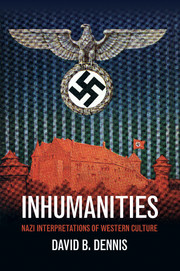Book contents
- Frontmatter
- Contents
- List of Illustrations
- Acknowledgments
- Introduction
- Part I Foundations of Nazi Cultural History
- 1 The “Germanic” Origins of Western Culture
- 2 Vox Volkish
- 3 The Western Tradition as Political and Patriotic
- 4 The Western Tradition as anti-Semitic
- 5 The Archenemy Incarnate
- Part II Blind to the Light
- Part III Modern Dilemmas
- Part IV “Holy” War and Weimar “Crisis”
- Part V Nazi “Solutions”
- Notes
- Index
4 - The Western Tradition as anti-Semitic
Published online by Cambridge University Press: 05 October 2012
- Frontmatter
- Contents
- List of Illustrations
- Acknowledgments
- Introduction
- Part I Foundations of Nazi Cultural History
- 1 The “Germanic” Origins of Western Culture
- 2 Vox Volkish
- 3 The Western Tradition as Political and Patriotic
- 4 The Western Tradition as anti-Semitic
- 5 The Archenemy Incarnate
- Part II Blind to the Light
- Part III Modern Dilemmas
- Part IV “Holy” War and Weimar “Crisis”
- Part V Nazi “Solutions”
- Notes
- Index
Summary
Establishing that the greats of the tradition were Germanic, grounded in popular existence, and politically active in the service of nationalism were important goals of cultural reporting in the Völkischer Beobachter. But the paper gave uppermost priority to convincing its readers that anti-Semitism served as a primary motivation for the artists, writers, and composers it preferred. Clearly, this was a major component of the anti-Semitic propaganda at the core of Nazism. In Saul Friedländer’s words: “the Nazi system as a whole produced an ‘anti-Jewish culture,’ partly rooted in historical German and European Christian anti-Semitism but also fostered by all the means at the disposal of the regime and propelled to a unique level of incandescence, with a direct impact on collective and individual behavior.” The role of German academics in the construction of a culture targeting “others” – especially the Jewish enemy – ostensibly arrayed in opposition against supposedly Germanic ideals has been the object of increasing scholarly attention. Concentrating on major front-page stories of the Völkischer Beobachter, moreover, Jeffrey Herf has shown how articles in Hitler’s main media instrument were “central elements in the regime’s anti-Semitic campaigns and in the translation of Nazi ideology into an ongoing anti-Semitic narrative of events.” Here we study a synthesis of both these prongs of Nazi Kulturpolitik: how cultural-historical interpretations that appeared in the party’s daily “combat paper” contributed to the campaign of hatred. As we have seen, one contributor stated her view of the paper’s function in this process most explicitly: “to win over to our movement spiritual leaders who think they see something distasteful in anti-Semitism, it is extremely important to present more and more evidence that great, recognized spirits shared our hatred of Jewry.”
- Type
- Chapter
- Information
- InhumanitiesNazi Interpretations of Western Culture, pp. 84 - 105Publisher: Cambridge University PressPrint publication year: 2012



